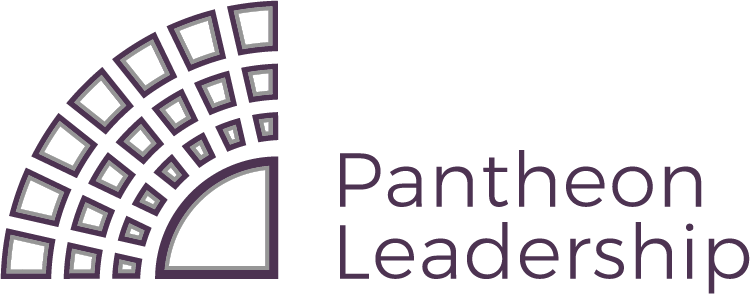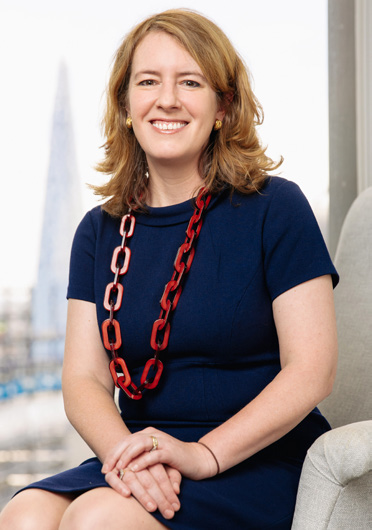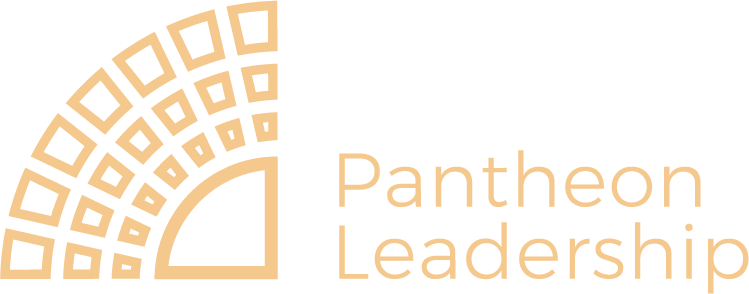Executive Summary
Boards are grappling with increasingly complex and systemic challenges. These include regulatory and compliance pressures, market volatility and increased pressures from activists and other stakeholders. These challenges have brought both the Board’s value and the skills required into sharp focus. It is more important than ever to bring together individuals with the skills and experiences who can deliver this value and also set the right cultural tone for the organisation.
Numerous reports have been published on the theme of what constitutes an effective Non-Executive Director. This initiative sought to replace anecdote with analytic rigour and support the UK Financial Services industry to improve its ability to identify, evaluate and develop the most critical competencies for success at the Board level.
Our Approach
We undertook a combined quantitative and qualitative research study to gain insights into the qualities and capabilities considered most important in serving and prospective Non-Executive Directors in the UK Financial Services Sector. In addition, we were keen to understand how frequently those same qualities were observed in the Boardroom.
The purpose of this effort has been to provide insights to aspiring Non-Executive Directors about what it takes to be effective in the role and to provide recommendations to Boards regarding Non-Executive Director selection and development to improve their collective impact. Our research has focused on the UK Financial Services sector. However, it has broader implications for other sectors.
We spoke to close to 200 active Non-Executive
Directors, including 60 Chairs, who serve on a wide
array of listed, subsidiary and PE-backed businesses in
the UK Financial Services sector.
With respect to prospective and experienced Non-
Executive Directors, we captured our respondents’
perceptions of three aspects of non-executive impact and
development:
- Which skills lead to the most impact as a Non-
Executive Director? - How frequently are the most important skills
observed on the Boards on which they serve? - How much support do and should Boards provide
their Non-Executive Directors (NEDs) to develop
these skills, both initially and on an ongoing basis?
- Overall, respondents indicated a high degree of consensus about the:
- Most impactful behaviours and attributes in NEDs.
- Capabilities that needed to be more apparent in
the Boardroom, particularly around interpersonal
behaviours. - Need for more upfront and ongoing development
of NEDs throughout their portfolio careers. - Desire for much greater investment in (and a
more diverse range of) initiatives to develop these
skills and capabilities amongst NEDs, both at the
individual and wider Board levels.

Areas of NED Impact
The findings highlighted three main areas of potential
impact: executive experience & credibility, commercial
capabilities and mindsets & interpersonal behaviours.
Within these areas, the research indicated that whilst
executive track records and technical skills are important,
they are the baseline only; they are not enough on their own.
Commercial capabilities were considered more of
a performance differentiator with high-impact NEDs
demonstrating an ability to maintain strategic clarity,
a level of healthy dispassion and sound judgement
under great pressure. These qualities have become
increasingly important, given the complex and
systemic challenges with which Boards are grappling.
However, over and above these qualities, the research
indicates that Board Directors’ mindsets, as well as their
interpersonal skills and behaviours have the greatest
impact on Board effectiveness.
There were six interpersonal and behavioural themes most cited by respondents as important differentiators between low and high-impact NEDs. These behaviours were:

High Self-Awareness
A learning and growth mindset evident; awareness of own potential biases

Awareness of Group Dynamics
Able to constructively challenge
and willing to articulate a
counter-intuitive point of view;
supportive, yet impartial

Mindset and Communication Skills
Curiosity and the ability to ask
good questions; adapts style
to situation; listens well and
facilitates reflection and debate

Networking and Relationship Building Skills
Invests in relationships, particularly with the CEO and also with Board colleagues and external stakeholders

Resilience and Calmness Under Pressure
Provides measured and balanced judgement in decision making, regardless of the situation

Being a Team Player
Actively supports effective functioning of the Board processes and culture; commits to the collective decision once taken
Need for more of the most Critical Skills
Interestingly, our respondents noted that these same interpersonal and behavioural themes were not observed with the desired frequency in the Boardroom. Within this, respondents wanted to see greater levels of self-awareness in fellow NEDs, including as it relates to potential agendas or biases. This suggests a development area for Boards and the wider non-executive community.
Specifically, we assessed each capability, measuring the difference between its perceived importance and how frequently it was observed in the Boardroom. Overall, we found that capabilities were split into
three main groups (see Figure 1).
Baseline Impact: relatively less
important criteria where only a
marginal difference exists between
importance and frequency observed.
These relate to executive track
record, subject matter expertise and
understanding of the basics of being
a non-executive. These attributes
are increasingly regarded as a given
rather than the goal.
Maintain and Renew Impact:
relatively more important criteria that respondents also noted a desire to see in higher levels on their Boards. These relate to a NED’s style, quality and breadth of relationships and overall commitment level.
Develop and Invest for Impact:
the most important criteria with
the largest differential between
importance and frequency observed.
Indicates a need for significant
further investment. These relate to
increased levels of self-awareness,
courage, curiosity, as well as the
ability to elevate the quality and
content of Boardroom discussions.
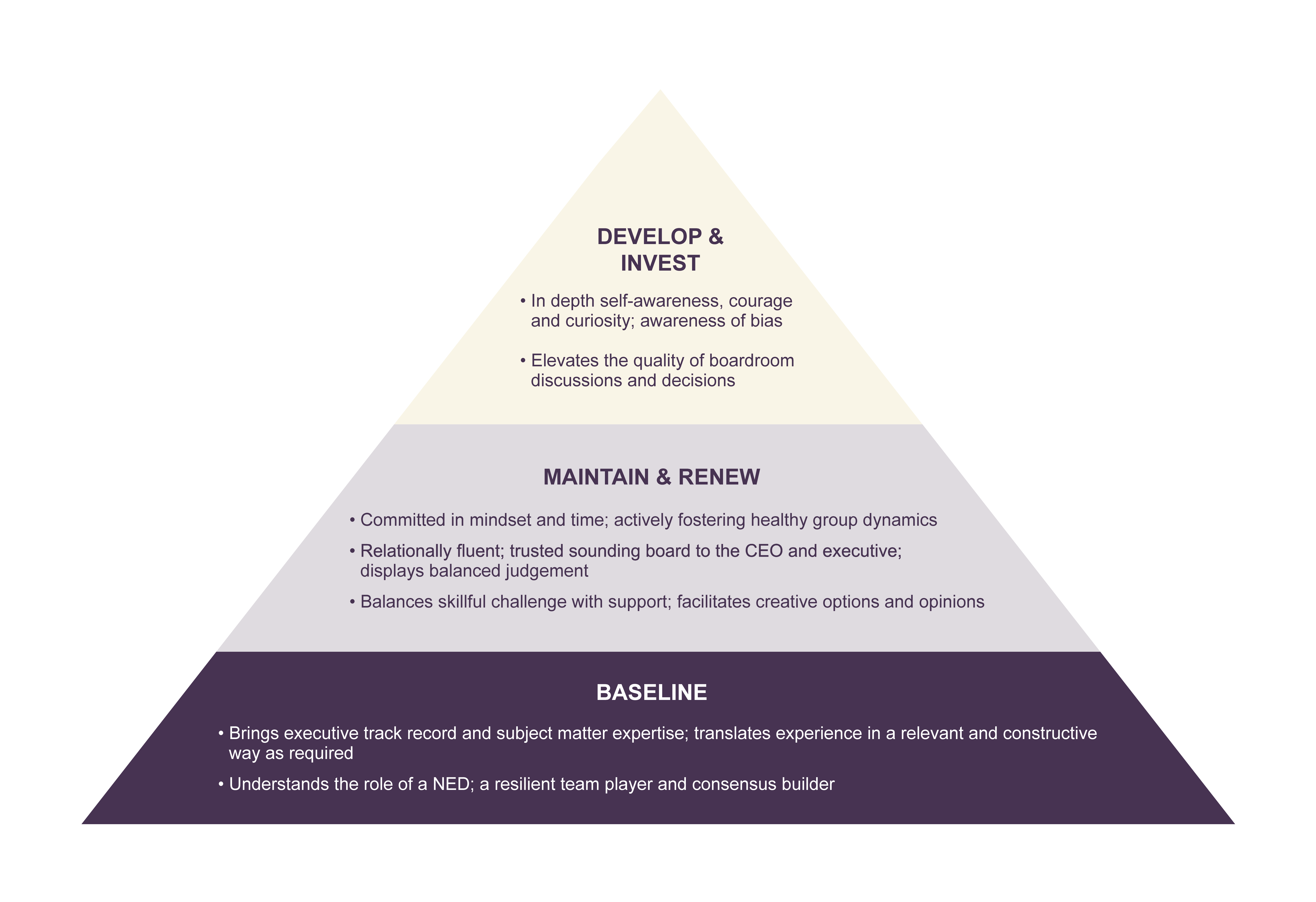
Increasing Board Development Needs
Our discussions highlighted the strong appetite for support that improves NED impact at all stages of a portfolio career. Respondents indicated that most Boards provide some support, but noted that this was often informal, incomplete and focused on process. For example, respondents noted the importance of providing
NEDs with a good initiation to the Board’s processes, culture and expectations. However, respondents also noted that the level and relevance of this preparation varied significantly, with some NEDs having little to no induction.
Respondents indicated that they wanted more support developing specialist knowledge and navigating more complicated interpersonal dynamics. Respondents also indicated the importance of more interventions that support continued NED growth and effectiveness. External Board Effectiveness Reviews
were cited as the most frequently used development tool for the wider Board. However, they also noted that the level of the insight and ‘stickiness’ of these exercises
could be significantly improved. Respondents said they wanted higher levels of coaching, mentoring and feedback from Board colleagues. Many also expressed a desire for help making the initial transition into the Boardroom and learning how to balance creative tensions that may emerge between executive and non-executive responsibilities. Respondents cited the following areas that needed greater support for NEDs:
- Transitioning from executive to non-executive
remits. - Balancing tensions that may arise between the non-executive and executive responsibilities, both
in setting direction and ensuring accountability. - Obtaining more feedback from the Chair and Board
colleagues, formally and informally. Embedding these conversations into the Board calendar are becoming increasingly best practice on the most effective Boards. - Coaching and mentoring to support NEDs transition
into new roles, responsibilities and dynamics across portfolio careers. - Training programmers and courses including formal
NED training as well as courses that build an even
richer understanding of the business and competitive
landscape in which they operate.

Conclusions
Ensuring that Boards have the right balance of skills, mindsets and capabilities to make effective decisions in pressured circumstances will only become more important. Our research suggests two main areas of potential exposure for
Boards by highlighting the mismatch between the demand and apparent supply of critical Boardroom capabilities.
First, in the initial NED selection process, there seems to be a need to target the most important qualities more
explicitly and forensically. This includes through more targeted psychometrics. Secondly, the findings indicate a need
and desire to invest more in the development of these skills in NEDs throughout their portfolio careers, including
through coaching, mentoring and Board dynamics exercises. Specifically, respondents indicated a need to:
- Provide more consistent and meaningful onboarding
and induction processes for new NED appointments to
ensure they transition well into their roles. This includes
processes, cultures, roles and responsibilities. - Provide external coaching and mentoring support for
NEDs to support their transition into new roles and
hone the capabilities that improve their impact. - Invest in Board dynamics and effectiveness exercises
that provide greater insights into the Board’s collective
strengths and development areas across behaviours,
mindsets and commercial capabilities and also lead
to real change. - Support improved NED selection by identifying
candidates earlier with the most impactful qualities,
including through psychometric assessments.
Pantheon Leadership has and continues to develop a suite of services to meet these needs and mitigate Board exposure. These include:

Tailored Onboarding
Supporting NEDs to make
the most of their strengths
and identify areas for growth,
including with targeted
psychometrics

Integrated Board Dynamics and Development
Strengthening collective
Board capabilities
and relationships

Coaching and Mentoring
Supporting NEDs to transition
into their first or new NED
appointments, take on larger
leadership remits, find their
distinctive style and have
more impact

Selection Assessment
Supporting Boards to identify
high-impact NED capabilities,
including with targeted
psychometrics

Board Diversity and Cultural Inclusiveness
Improving the Board’s ability
to embrace and include
different perspectives

NEDSchool
Providing an in-house short
course to increase the
gene-pool of high-quality NEDs
and Chairs

